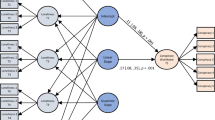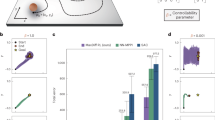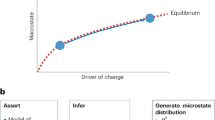Abstract
Natural selection is conventionally assumed to favour the strong and selfish who maximize their own resources at the expense of others. But many biological systems, and especially human societies, are organized around altruistic, cooperative interactions. How can natural selection promote unselfish behaviour? Various mechanisms have been proposed, and a rich analysis of indirect reciprocity has recently emerged: I help you and somebody else helps me. The evolution of cooperation by indirect reciprocity leads to reputation building, morality judgement and complex social interactions with ever-increasing cognitive demands.
This is a preview of subscription content, access via your institution
Access options
Subscribe to this journal
Receive 51 print issues and online access
$199.00 per year
only $3.90 per issue
Buy this article
- Purchase on Springer Link
- Instant access to full article PDF
Prices may be subject to local taxes which are calculated during checkout



Similar content being viewed by others
References
Trivers, R. The evolution of reciprocal altruism. Q. Rev. Biol. 46, 35–57 (1971)
Alexander, R. D. The Biology of Moral Systems (Aldine de Gruyter, New York, 1987)
Binmore, K. G. Game Theory and the Social Contract (MIT Press, Cambridge, Massachusetts, 1994)
Seabright, P. The Company of Strangers: A Natural History of Economic Life (Princeton Univ. Press, Princeton, 2004)
Bolton, G. E., Katok, E. & Ockenfels, A. How effective are electronic reputation mechanisms? An experimental investigation. Manage. Sci. 50, 1587–1602 (2004)
Keser, C. Trust and reputation building in e-commerce. IBM Watson Research Center, CIRANO working paper no. 2002s-75 http://www.cirano.qc.ca/en/publication_detail.php?id=2002s-75 (2002).
Dellarocas, C. Sanctioning reputation mechanisms in online trading environments with moral hazard. MIT Sloan School of Management working paper no. 4297–03 http://ssrn.com/abstract=393043 (2003).
Bolton, G., Katok, E. & Ockenfels, A. in Applications of Supply Chain Management and e-Commerce Research (eds Geunes, J., Akcali, E., Pardalos, P. M., Romeijn, H. E. & Shen, Z.-J.) 195–216 (Springer, Dordrecht, 2005)
Resnick, P., Zeckhauser, R., Friedman, E. & Kuwabara, K. Reputation systems. Commun. ACM 43, 45–48 (2000)
Lucking-Reiley, D., Bryan, D., Prasad, N. & Reeves, D. Pennies from eBay: The Determinants of Price in Online Auctions. Vanderbilt Univ., Univ. Arizona working paper (1999).
Maynard Smith, J. & Szathmary, E. The Major Transitions in Evolution (Oxford Univ. Press, Oxford, 1997)
Wilson, E. O. Sociobiology (Harvard Univ. Press, Cambridge, Massachusetts, 1975)
Trivers, R. Social Evolution (Benjamin Cummings, Menlo Park, 1985)
Hamilton, W. D. Narrow Roads of Gene Land Vol. 1 (Freeman, New York, 1996)
Sanfey, A. G., Rilling, J. K., Aronson, J. A., Nystrom, L. E. & Cohen, J. D. The neural basis of economic decision-making in the ultimatum game. Science 300, 1755–1758 (2003)
Rilling, J. K. et al. A neural basis for social cooperation. Neuron 35, 395–405 (2002)
Fehr, E. The neural basis of altruistic punishment. Science 305, 1254–1258 (2004)
Dunbar, R. Grooming, Gossip and the Evolution of Language (Harvard Univ. Press, Cambridge, Massachusetts, 1996)
Brown, D. E. Human Universals (McGraw-Hill, New York, 1991)
Whiten, A. & Byrne, R. W. (eds) Machiavellian Intelligence II: Extensions and Evaluations (Cambridge Univ. Press, Cambridge, UK, 1997)
Axelrod, R. The Evolution of Cooperation (Reprinted by Penguin, Harmondsworth, 1989.) (Basic Books, New York, 1984)
Nowak, M. A. & Sigmund, K. The alternating prisoner's dilemma. J. Theor. Biol. 168, 219–226 (1994)
Frean, M. R. The prisoner's dilemma without synchrony. Proc. R. Soc. Lond. B 257, 75–79 (1994)
Berg, J., Dickhaut, J. & McCabe, K. Trust, reciprocity and social history. Games Econ. Behav. 10, 122–142 (1995)
Fudenberg, D. & Maskin, E. The folk theorem in repeated games with discounting or with incomplete information. Econometrica 50, 533–554 (1986)
Binmore, K. Fun and Games: A Text on Game Theory (Heath, Lexington, Massachusetts, 1992)
Rosenthal, R. W. Sequences of games with varying opponents. Econometrica 47, 1353–1366 (1979)
Kandori, M. Social norms and community enforcement. Rev. Econ. Stud. 59, 63–80 (1992)
Ellison, G. Cooperation in the prisoner's dilemma with anonymous random matching. Rev. Econ. Stud. 61, 567–588 (1994)
Okuno-Fujiwara, M. & Postlewaite, A. Social norms in matching games. Games Econ. Behav. 9, 79–109 (1995)
Nowak, M. A. & Sigmund, K. Evolutionary dynamics of biological games. Science 303, 793–799 (2004)
Nowak, M. A. & Sigmund, K. Tit for tat in heterogeneous populations. Nature 355, 250–253 (1992)
Nowak, M. A., Sasaki, A., Taylor, C. & Fudenberg, D. Emergence of cooperation and evolutionary stability in finite populations. Nature 428, 646–650 (2004)
Axelrod, R. & Hamilton, W. D. The evolution of cooperation. Science 211, 1390–1396 (1981)
Nowak, M. A. & Sigmund, K. A strategy of win-stay, lose-shift that outperforms tit-for-tat in the prisoner's dilemma game. Nature 364, 56–58 (1993)
Nowak, M. A. & Sigmund, K. Evolution of indirect reciprocity by image scoring. Nature 393, 573–577 (1998)
Wedekind, C. Give and ye shall be recognized. Science 280, 2070–2071 (1998)
Ferrière, R. Help and you shall be helped. Nature 393, 517–519 (1998)
Leimar, O. & Hammerstein, P. Evolution of cooperation through indirect reciprocation. Proc. R. Soc. Lond. B 268, 745–753 (2001)
Panchanathan, K. & Boyd, R. A tale of two defectors: The importance of standing for evolution of indirect reciprocity. J. Theor. Biol. 224, 115–126 (2003)
Nowak, M. A. & Sigmund, K. The dynamics of indirect reciprocity. J. Theor. Biol. 194, 561–574 (1998)
Ohtsuki, H. & Iwasa, Y. How should we define goodness? Reputation dynamics in indirect reciprocity. J. Theor. Biol. 231, 107–120 (2004)
Dawes, R. M. Social dilemmas. Annu. Rev. Psychol. 31, 169–193 (1980)
Fehr, E. & Gächter, S. Cooperation and punishment in public goods experiments. Am. Econ. Rev. 90, 980–994 (2000)
Fehr, E. & Gächter, S. Altruistic punishment in humans. Nature 415, 137–140 (2002)
Fehr, E. & Fischbacher, U. The nature of human altruism. Nature 425, 785–791 (2003)
Sigmund, K., Hauert, C. & Nowak, M. A. Reward and punishment. Proc. Natl Acad. Sci. USA 98, 10757–10762 (2001)
Sugden, R. The Economics of Rights, Cooperation and Welfare (Blackwell, Oxford, 1986)
Ohtsuki, H. & Iwasa, Y. The leading eight: social norms that can maintain cooperation by indirect reciprocity. J. Theor. Biol.(in the press)
Lotem, A., Fishman, M. A. & Stone, L. Evolution of cooperation between individuals. Nature 400, 226–227 (1999)
Lotem, A., Fishman, M. A. & Stone, L. Evolution of unconditional altruism through signalling benefits. Proc. R. Soc. Lond. B 270, 199–205 (2002)
Fishman, M. A., Lotem, A. & Stone, L. Heterogeneity stabilises reciprocal altruism interaction. J. Theor. Biol. 209, 87–95 (2001)
Fishman, M. A. Indirect reciprocity among imperfect individuals. J. Theor. Biol. 225, 285–292 (2003)
Brandt, H. & Sigmund, K. The logic of reprobation: Assessment and action rules for indirect reciprocity. J. Theor. Biol. 231, 475–486 (2004)
Mohtashemi, M. & Mui, L. Evolution of indirect reciprocity by social information: The role of trust and reputation in evolution of altruism. J. Theor. Biol. 223, 523–531 (2003)
Brandt, H. & Sigmund, K. Indirect reciprocity, image scoring, and moral hazard. Proc. Natl Acad. Sci. USA 102, 2666–2670 (2005)
Takahashi, N. & Mashima, R. The emergence of indirect reciprocity: Is the standing strategy the answer? Hokkaido Univ. working paper no. 29 http://lynx.let.hokudai.ac.jp/COE21/pdf/029.zip (2003).
Wilson, D. S. A theory of group selection. Proc. Natl Acad. Sci. USA 72, 143–146 (1975)
Wedekind, C. & Milinski, M. Cooperation through image scoring in humans. Science 288, 850–852 (2000)
Seinen, I. & Schram, A. Social status and group norms: Indirect reciprocity in a repeated helping experiment. Eur. Econ. Rev. (in the press)
Haley, K. J. & Kessler, D. M. T. Nobody is watching?: Subtle cues affect generosity in an anonymous economic game. Evol. Hum. Behav. 26, 245–256 (2005)
Bolton, G. E., Katok, E. & Ockenfels, A. Cooperation among strangers with limited information about reputation. J. Public Econ. 89, 1457–1468 (2005)
Wedekind, C. & Braithwaite, V. A. The long-term benefits of human generosity in indirect reciprocity. Curr. Biol. 12, 1012–1015 (2002)
Engelmann, D. & Fischbacher, U. Indirect reciprocity and strategic reputation building in an experimental helping game. Univ. Zürich working paper no. 132 http://www.iew.unizh.ch/wp/iewwp132.pdf (2002).
Milinski, M., Semmann, D., Bakker, T. C. M. & Krambeck, H. J. Cooperation through indirect reciprocity: Image scoring or standing strategy? Proc. R. Soc. Lond. B 268, 2495–2501 (2001)
Greiner, B. & Levati, M. V. Indirect reciprocity in cyclical networks: An experimental study. Max Planck Institute, Jena, working paper no. 2003-15 ftp://papers.mpiew-jena.mpg.de/esi/discussionpapers/2003-15.pdf (2003).
Dufwenberg, M., Gneezy, U., Güth, W. & van Damme, E. Direct vs indirect reciprocity: An experiment. Homo Oecon. 18, 19–30 (2001)
Güth, W., Königstein, M., Marchand, N. & Nehring, K. Trust and reciprocity in the investment game with indirect reward. Homo Oecon. 18, 241–262 (2001)
Pollock, G. B. & Dugatkin, L. A. Reciprocity and the evolution of reputation. J. Theor. Biol. 159, 25–37 (1992)
Gintis, H. Game Theory Evolving: A Problem-Centered Introduction to Modeling Stategic Interaction (Princeton Univ. Press, Princeton, 2000)
Fehr, E. & Fischbacher, U. Social norms and human cooperation. Trends Cogn. Sci. 8, 185–190 (2004)
Fehr, E. & Fischbacher, U. Third party punishment and social norms. Evol. Hum. Behav. 25, 63–87 (2004)
Milinski, M., Semmann, D. & Krambeck, H. J. Donors in charity gain in both indirect reciprocity and political reputation. Proc. R. Soc. Lond. B 269, 881–883 (2002)
Milinski, M., Semmann, D. & Krambeck, H. J. Reputation helps solve the ‘tragedy of the commons’. Nature 415, 424–426 (2002)
Panchanathen, K. & Boyd, R. Indirect reciprocity can stabilize cooperation without the second-order free-rider problem. Nature 432, 499–502 (2004)
Fehr, E. Don't lose your reputation. Nature 432, 449–450 (2004)
Boyd, R. & Richerson, P. J. The evolution of indirect reciprocity. Soc. Networks 11, 213–236 (1989)
Pfeiffer, T., Rutte, C., Killingback, T., Taborsky, M. & Bonhoeffer, S. Evolution of cooperation by generalized reciprocity. Proc. R. Soc. B 272, 1115–1120 (2005)
Brandt, H. & Sigmund, K. The good, the bad and the discriminator. J. Theor. Biol. (in the press)
Imhof, L., Fudenberg, D. & Nowak, M. A. Evolutionary cycles of cooperation and defection. Proc. Natl Acad. Sci. USA 102, 10797–10800 (2005)
Camerer, C. E. Behavioral Game Theory (Princeton Univ. Press, Princeton, 2003)
Colman, A. M. Game Theory and its Applications in the Social and Biological Sciences (Butterworth-Heinemann, Oxford, 1995)
Arrow, K. The Limits of Organization (Norton, New York, 1974)
Kosfeld, M., Heinrichs, M., Zak, P., Fischbacher, U. & Fehr, E. Oxytocin increases trust in humans. Nature 435, 673–676 (2005)
Milgrom, P., North, D. & Weingast, B. The role of institutions in the revival of trade: The law merchant, private judges, and the champagne fairs. Econ. Politics 2, 1–23 (1990)
Suzuki, Y. & Toquenaga, Y. Effects of information and group structure on evolution of altruism: Analysis of two-score model by covariance and contextual analyses. J. Theor. Biol. 232, 191–203 (2005)
Fudenberg, D. & Maskin, E. Evolution of cooperation in noisy repeated games. American Economic Reviewl. 80, 274–279 (1990)
Acknowledgements
Support from the John Templeton Foundation is gratefully acknowledged. The Program for Evolutionary Dynamics at Harvard University is sponsored by Jeffrey Epstein.
Author information
Authors and Affiliations
Corresponding author
Ethics declarations
Competing interests
Reprints and permissions information is available at npg.nature.com/reprintsandpermissions. The authors declare no competing financial interests.
Rights and permissions
About this article
Cite this article
Nowak, M., Sigmund, K. Evolution of indirect reciprocity. Nature 437, 1291–1298 (2005). https://doi.org/10.1038/nature04131
Issue Date:
DOI: https://doi.org/10.1038/nature04131
This article is cited by
-
Discipline and punishment in panoptical public goods games
Scientific Reports (2024)
-
Group environment promotes the third-party punishment for maintaining social fairness: evidence from ERPs and neural oscillations
Current Psychology (2024)
-
Negative school gossip and prosocial behavior among high school students: mediated by basic psychological needs satisfaction and moderated by self-compassion
Current Psychology (2024)
-
Four Puzzles of Reputation-Based Cooperation
Human Nature (2022)
-
Positive downstream indirect reciprocity scale (PoDIRS–6): Construction and psychometric characteristics
Current Psychology (2022)
Comments
By submitting a comment you agree to abide by our Terms and Community Guidelines. If you find something abusive or that does not comply with our terms or guidelines please flag it as inappropriate.



